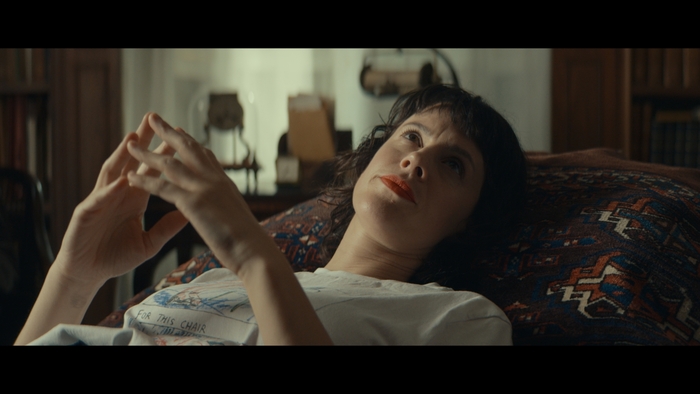On Friday June 3, 1994, with an ambulance at the door of the set, Massimo Troisi finished filming
The Postman (and Pablo Neruda).
That week he had only filmed one more day, Tuesday, and the rest of the days he had dedicated to recording dialogues for the film that could not be understood due to the noise on the outside shoots.
The following Sunday, the 5th, he was to be hospitalized.
He needed a new heart for months.
However, he had postponed the transplant, prioritizing a project he had dreamed of for a long time.
He didn't arrive on time.
On Saturday June 4, Troisi, a legend of Italian cinema at just 41 years old, died at his home in Rome.
More information
Massimo Troisi, actor
Last Sunday, February 19, Troisi would have turned 70 years old.
In Italy that weekend the rooms were overturned with cycles and tributes.
In his hometown, Naples, the celebration has been even bigger.
"There we consider him the great hero," explains the filmmaker Mario Martone, also a Neapolitan pro.
Martone has been the representative of Italy at the Oscars this year with
Nostalgia,
but during the promotional campaign in the United States he was more attentive to the production of his documentary
Laggiù qualcuno mi ama
(Someone Loves Me Down There), a song to Troisi and his I work as a filmmaker.
In addition to being a comedian, the Neapolitan directed six films.
Martone, who has presented the documentary at a special gala at the Berlinale, points out in conversation with EL PAÍS:
“The Postman (and Pablo Neruda)
would have been his seventh film as a director.
But he had a premonition, he sensed his death.
That's why he called Michael Radford, whom he had met when the Englishman offered him the male lead in
Another Time, Another Place.
Troisi could not accept that project because it overlapped with another of his films, although he felt his and Radford's sensibilities were close.
Martone knows well what happened on that shoot: at that time his partner was the actress Anna Bonaiuto, who played Neruda's wife.
“Troisi launched into shooting the film without a net, in love with the book
Ardente paciencia,
by Antonio Skármeta”, he points out.
He did not care that the Chilean writer had directed another adaptation himself in 1983, and moved the action from Isla Negra to a small and anonymous Italian island (it was filmed in the Gulf of Naples).
“He spoke of ordinary people, poetry, love and politics.
Just what he was passionate about."
From the left, Ettore Scola, Massimo Troisi and Marcello Mastroianni, on the set of 'What time is it?'.
In Spain, Troisi is known for that film and for his participation in
¿Qué hora es?
(1989), by Ettore Scola, in which he plays the son of Marcello Mastroianni.
"In my country he was one of the most popular and grossing comedians," Martone recalls of an actor who made only 13 films (three under Scola's direction) and one series.
But he left a legacy as a director.
“It's funny how the character he built throughout his career goes through films like the ones played by Jean-Pierre Léaud in the films of François Truffaut, another director who died in the prime of his career.
Troisi drinks from the
nouvelle vague
because, as in the French movement, his cinema revolves around life, love, and the political issues that affect the human being”.
Did it sound so new to Italians?
“Yes, it was the first voice of a young generation.
When in 1981 he premiered
Empezar desde tres,
many of us felt that we were finally going out in the cinema.
Obviously, the old critics attacked her.
What's more, during Massimo's lifetime only one book was written about him, and he is confronted by two young journalists.
Troisi's cinema speaks of our fragility, of our inability to talk about certain issues and to mature.
That was us."
Mario Martone, in the editing of 'Laggiù qualcuno mi ama'
Troisi always suffered from delicate health.
“His aura about him gives it away.
The fragility that he showed was also born from his body, ”says Martone.
On screen, the singer Pino Daniele, who died in 2015, explains in an archive interview: "The souls of Chaplin and Massimo shared the same sensitivity."
Another of the most famous Neapolitans, Paolo Sorrentino, talks about his "immense charisma" while the documentary shows Troisi and Diego Armando Maradona, two local gods, embracing laughing in a duel of humility: "You are better than me" ;
"No, you are better";
"Not you"...
Massimo Troisi, in one of his shoots as a director.
The first time that Martone and Troisi crossed paths was not even in Italy: “We met together at a festival in Montpellier.
We were together in a restaurant, the usual cordiality and a little cold, and on the way back to the hotel, we suddenly struck up a very intimate conversation.
That was Troisi, a reserved guy who hid a great human warmth, elegant and discreet despite his popularity ”.
That popularity, Sorrentino recounts in
Laggiù qualcuno mi ama,
was born from the fact that "he defended that comedy be at the service of exploring feelings."
Roberto Benigni and Massimo Troisi, in 'Non ci resta che piangere'.
In 1984, Roberto Benigni, another of the great Italian comic stars, and Troisi come together in
Non ci resta che piangere.
The two direct it and co-write it between them and Giuseppe Bertolucci, who in another archive interview (he died in 2012), confesses: “They were two completely opposite comic worlds.
Roberto is rooted in Giovanni Boccaccio, while Troisi belongs to a darker, more metaphysical school”.
“And the incredible thing,” says Martone in Berlin, “is that they fit into this story of two friends from the eighties who one fine day wake up in the 15th century, and the film is a box office success.”
As much as Troisi denied himself as a filmmaker (in multiple interviews, he hides behind "I'm not a director"), and critics didn't value him either, for Martone "Italy lost a different creator, necessary to give us a voice and understand a generation.
Troisi with Michael Radford on the set of 'The Postman (and Pablo Neruda)'
Back to
The Postman (and Pablo Neruda).
“He achieved his dream at the cost of his life.
He knew what he was doing, ”says the filmmaker.
“The curious thing is that once the film has been released, any memory of Troisi is accompanied by the music of Luis Bacalov, which was composed after his death, during post-production.
I respect Radford a lot, but that movie is as much about him as it is about Massimo."
That soundtrack won the Oscar, and Troisi was a posthumous candidate for best actor and adapted screenplay.
Martone concludes: “Were you interested in the prizes?
I don't know.
What would have made him happy is to see how even today people love that humble postman and his desire for love ”.
Subscribe to continue reading
Read without limits
Keep reading
I'm already a subscriber

/cloudfront-eu-central-1.images.arcpublishing.com/prisa/3HIOW6L7YJBLBM5I3DZXXKEGK4.webp)






/cloudfront-eu-central-1.images.arcpublishing.com/prisa/YHRHMPGO3JDGJFNH2GZCXEKE4I.jpg)
